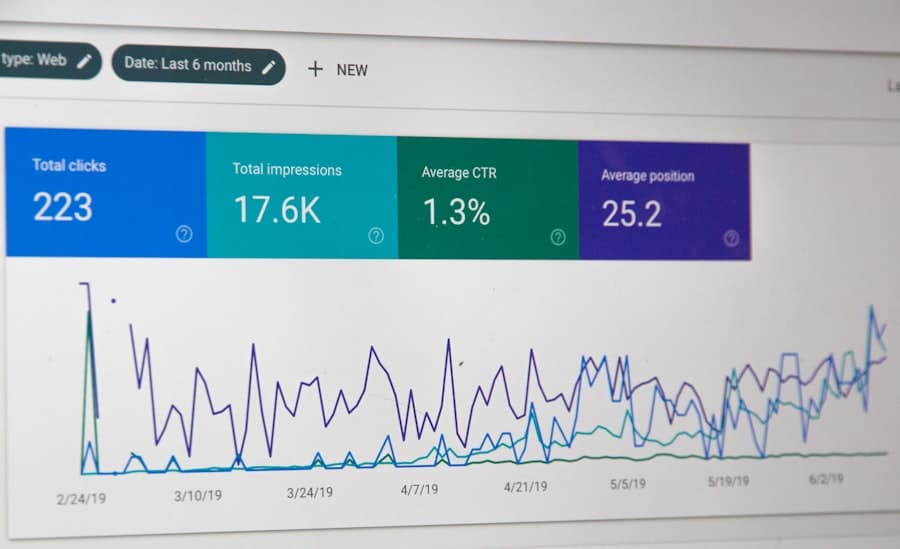The digital landscape has undergone a seismic shift with the advent of artificial intelligence (AI), particularly in the realm of search engine algorithms. Traditional search engines relied heavily on keyword matching and basic ranking factors to deliver results. However, the integration of AI has revolutionized this process, enabling search engines to understand user intent, context, and even sentiment.
This transformation is not merely a technological upgrade; it represents a fundamental change in how information is retrieved and presented to users. As AI continues to evolve, it is reshaping the very fabric of online information retrieval, making it more intuitive and user-centric. AI-enhanced search engine algorithms leverage machine learning, natural language processing, and data analytics to refine search results.
These algorithms analyze vast amounts of data, learning from user interactions to improve their accuracy and relevance over time. For instance, Google’s RankBrain, an AI component of its search algorithm, uses machine learning to interpret queries and deliver results that align more closely with user expectations. This shift towards AI-driven methodologies not only enhances the efficiency of search engines but also raises important questions about the implications of such technologies on information accessibility and user experience.
Key Takeaways
- AI-enhanced search engine algorithms use artificial intelligence to improve search results and user experience.
- AI plays a crucial role in understanding user intent, context, and relevance to deliver more accurate search results.
- Ethical considerations and challenges include privacy concerns, bias in algorithms, and the impact on traditional search engine optimization (SEO) strategies.
- Advancements in natural language processing and understanding enable search engines to interpret and respond to complex queries more effectively.
- Personalization and customization in search engine results are driven by AI to deliver tailored experiences for individual users.
The Role of AI in Improving Search Engine Results
Personalized Search Results
For example, when a user types in a query like “best places to eat near me,” an AI-enhanced search engine can consider factors such as location, time of day, and even user preferences based on past searches to deliver tailored recommendations. Moreover, AI algorithms continuously learn from user interactions, refining their understanding of what constitutes relevant content.
Adapting to Changing Trends
This iterative learning process means that search engines can adapt to changing trends and user behaviors over time. For instance, if a particular restaurant receives a surge in positive reviews on social media, an AI-enhanced algorithm can recognize this trend and adjust its rankings accordingly.
Improved Accuracy and User Satisfaction
This dynamic adaptability not only improves the accuracy of search results but also enhances user satisfaction by providing timely and relevant information.
Ethical Considerations and Challenges of AI-Enhanced Search Engine Algorithms

While the benefits of AI-enhanced search engine algorithms are significant, they also raise important ethical considerations and challenges. One major concern is the potential for bias in algorithmic decision-making. AI systems learn from historical data, which may contain inherent biases that can be perpetuated in search results.
For example, if an algorithm is trained on data that reflects societal biases—such as gender or racial stereotypes—this can lead to skewed results that reinforce existing inequalities. Addressing these biases requires ongoing scrutiny and intervention to ensure that search engines provide fair and equitable access to information. Another ethical challenge lies in the transparency of AI algorithms.
Many users remain unaware of how their data is being used or how search results are generated. This lack of transparency can lead to mistrust in search engines and concerns about privacy. Users may feel uncomfortable knowing that their search history is being analyzed to personalize results without their explicit consent.
As AI continues to shape the landscape of information retrieval, it is crucial for companies to prioritize ethical practices, ensuring that users are informed about how their data is utilized and that they have control over their privacy settings.
Advancements in Natural Language Processing and Understanding
Natural language processing (NLP) has seen remarkable advancements in recent years, significantly enhancing the capabilities of AI-enhanced search engine algorithms. NLP enables machines to understand human language in a way that is both nuanced and contextually aware. This technology allows search engines to process queries that are phrased in natural language rather than relying solely on keyword-based searches.
For instance, users can now ask questions like “What are the health benefits of green tea?” instead of simply searching for “green tea benefits.” The ability to interpret such queries accurately has transformed the user experience. Furthermore, advancements in NLP have led to improved semantic understanding, allowing search engines to grasp the relationships between words and concepts. This means that when users input queries with synonyms or related terms, AI-enhanced algorithms can still deliver relevant results.
For example, a search for “automobile repair” might yield results for “car maintenance” or “vehicle servicing,” demonstrating the algorithm’s ability to understand the underlying meaning rather than just matching keywords. This level of comprehension not only enhances the relevance of search results but also fosters a more conversational interaction between users and search engines.
Personalization and Customization in Search Engine Results
Personalization has become a cornerstone of modern search engine functionality, driven largely by AI technologies. By analyzing user behavior, preferences, and historical data, AI-enhanced algorithms can tailor search results to individual users. This customization creates a more engaging experience, as users are presented with content that aligns with their interests and needs.
For instance, if a user frequently searches for vegan recipes, an AI-driven search engine will prioritize vegan-related content in future searches, making it easier for the user to find relevant information quickly. However, while personalization enhances user experience, it also raises concerns about filter bubbles and echo chambers. When users are consistently exposed to content that aligns with their existing beliefs or preferences, they may become less open to diverse perspectives or new ideas.
This phenomenon can limit exposure to a broader range of information and contribute to polarization in society. As such, it is essential for developers of AI-enhanced search engines to strike a balance between personalization and diversity in content delivery, ensuring that users have access to a wide array of viewpoints while still receiving tailored recommendations.
The Impact of AI on E-commerce and Online Advertising

The integration of AI into search engine algorithms has had a profound impact on e-commerce and online advertising strategies. For businesses operating in the digital marketplace, understanding how AI influences search results is crucial for optimizing visibility and driving sales. AI-enhanced algorithms enable more precise targeting of advertisements based on user behavior and preferences.
For example, if a user frequently searches for outdoor gear, an e-commerce platform can leverage this data to display targeted ads for hiking equipment or camping supplies. Additionally, AI-driven insights allow businesses to refine their marketing strategies by analyzing consumer trends and preferences in real-time. By utilizing predictive analytics powered by AI, companies can anticipate shifts in consumer behavior and adjust their advertising campaigns accordingly.
As e-commerce continues to grow, businesses that harness the power of AI-enhanced search engine algorithms will be better positioned to thrive in an increasingly competitive landscape.
Potential Future Developments and Innovations in AI-Enhanced Search Engine Algorithms
Looking ahead, the future of AI-enhanced search engine algorithms holds exciting possibilities for innovation and development. One area poised for growth is the integration of voice search capabilities powered by advanced natural language processing technologies. As voice-activated devices become more prevalent in households, optimizing search engines for voice queries will be essential.
This shift will require algorithms to adapt further to conversational language patterns and context-specific inquiries.
Future algorithms could leverage real-time data from various sources—such as social media activity or location-based services—to deliver hyper-personalized search results that reflect users’ immediate needs and preferences.
Additionally, as ethical considerations continue to gain prominence, there may be increased emphasis on developing transparent algorithms that prioritize fairness and accountability in information retrieval.
The Future of AI-Enhanced Search Engine Algorithms
As we navigate the evolving landscape of digital information retrieval, it is clear that AI-enhanced search engine algorithms will play a central role in shaping our online experiences. The ability of these algorithms to understand context, personalize results, and adapt to user behavior represents a significant leap forward from traditional methods of information retrieval. However, with these advancements come important ethical considerations that must be addressed to ensure equitable access to information.
The future promises further innovations driven by advancements in natural language processing and machine learning techniques. As voice search becomes more integrated into daily life and personalization strategies become increasingly sophisticated, users can expect an even more tailored experience when seeking information online. Ultimately, the ongoing development of AI-enhanced search engine algorithms will not only redefine how we access information but also influence broader societal dynamics as we engage with digital content in new ways.
In a recent article on enicomp.com, the Samsung Galaxy S22 Ultra is highlighted as a powerful device that can unlock the potential of AI technology. This article complements the discussion on the future of AI-enhanced search engine algorithms by showcasing how cutting-edge technology like the Samsung S22 Ultra can revolutionize the way we interact with AI. To learn more about this innovative device, check out Unlock the Power of the Galaxy with the Samsung S22 Ultra.
FAQs
What are AI-enhanced search engine algorithms?
AI-enhanced search engine algorithms are algorithms that use artificial intelligence (AI) techniques to improve the accuracy and relevance of search engine results. These algorithms use machine learning and natural language processing to understand user queries and deliver more personalized and contextually relevant search results.
How do AI-enhanced search engine algorithms work?
AI-enhanced search engine algorithms work by analyzing large amounts of data to understand user intent, context, and content relevance. They use machine learning models to continuously improve search results based on user interactions and feedback.
What are the benefits of AI-enhanced search engine algorithms?
The benefits of AI-enhanced search engine algorithms include more accurate and relevant search results, improved user experience, better understanding of user intent, and the ability to deliver personalized search results based on individual preferences and behavior.
What are the potential challenges of AI-enhanced search engine algorithms?
Some potential challenges of AI-enhanced search engine algorithms include privacy concerns related to personalized search results, the potential for algorithmic bias, and the need for continuous monitoring and improvement to ensure fairness and accuracy in search results.
How are AI-enhanced search engine algorithms shaping the future of search?
AI-enhanced search engine algorithms are shaping the future of search by enabling more personalized and contextually relevant search results, improving the understanding of user intent, and enhancing the overall search experience. These algorithms are also driving advancements in voice search, visual search, and other emerging search technologies.

